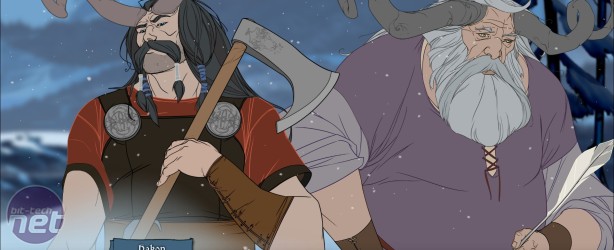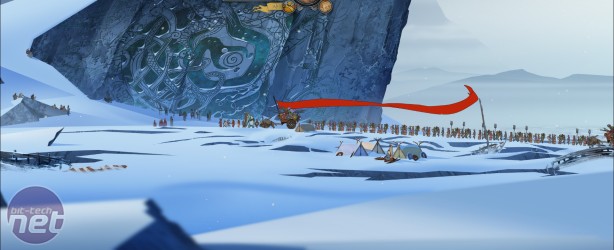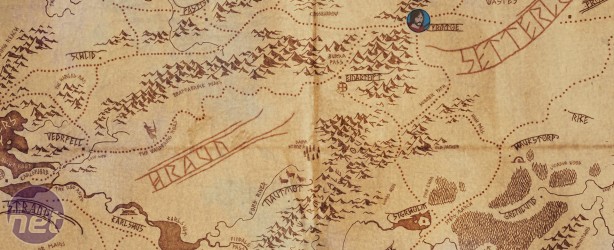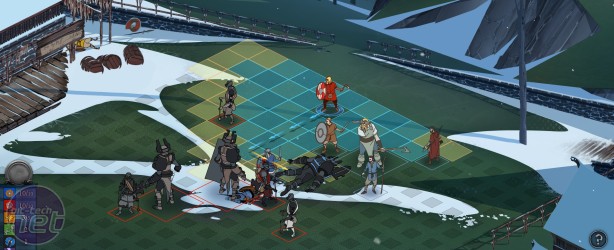
Alongside the story/dialogue sections, there are two other facets to The Banner Saga that make up the whole. The first is the aforementioned tactical combat. In these scenarios a party of up to six characters battle on a square set of tiles against either other Varl and humans, or Dredge, who come in various classes and sizes. Similarly, Varl and humans take up a different number of tiles on the board, which is where the first tactical element comes in. See, Varl are big and powerful, but their size can obstruct party members from getting at the enemy, meaning they have to be moved about the tiles with care.
Furthermore, each party member has a "Strength" bar, which doubles as both health and attack power, and an "Armour" bar that signifies damage absorption. Attacks can be dealt to damage either an opponent's strength or armour, and the less armour an opponent has, the more damage you'll do to their strength. At the same time, your own attacks will weaken as your opponents damage your own strength, so it's important to be dealing as much damage as possible while taking as few hits as you can, a difficult balancing act which will please your inner strategist.
There are various other systems that complement the combat's tactical nature, such as willpower. This can be added to attacks from the character's small pool of willpower points to deal a little extra damage. Lastly, each character has their own special powers that range from knock-backs to dealing damage to multiple opponents simultaneously. All these difference systems combine to form engagements that are challenging enough to require you to think tactically to progress, but on normal difficulty shouldn't obstruct you from enjoying the story too much. At least, not in the first half of the game.
This is where the third slice of the Banner Saga's epic dish comes into play. In between story and combat are periods of travel through the game's world. These are essentially cut-scenes interspersed with random events that can affect both the morale and supplies of your caravan (that's the medieval group of travellers type of caravan, not the disappointing holiday in Scarborough type of caravan). If either your morale or supplies dip too low during travel, people will start to abandon your caravan or simply die of starvation, affecting your capabilities during battle.
The trouble with this comes in the form of the game's currency, renown. Renown is mostly earned during battle, and is used to both upgrade your heroes’ abilities but also to buy supplies that are consumed on a daily basis regardless of whether you're travelling or resting to boost morale. Having one currency for both purchasing equipment and upgrading abilities means you're often forced to choose between the two, especially since The Banner Saga enjoys nothing more than regularly finding ways to nick your supplies. So you often end up with a roster of underdeveloped characters who are all too easily stomped on in later battles.
In addition, using renown as a universal currency means it's best to fight as many battles as possible, but the story often encourages you to avoid them. Having said that, after a while you'll probably feel like avoiding them anyway, because The Banner Saga isn't very good at keeping those battles varied or surprising. Your tactics will likely only change if you happen to lose a character during the story.
The reason for using renown as a universal currency is perhaps to tie the three different chunks of the Banner Saga together, because its component parts don't blend as well as ,say, the base-building and tactical missions in XCOM do. The Banner Saga can at times feel like three similarly-themed mini-games rather than a cohesive product. This isn't a constant problem, there are times when everything comes together, usually the points when a story arc comes to a head.
And it is the Saga itself that will keep you coming back. Its semi-dynamic twists and turns, the caravan's kindling of the tiniest of hopes in a frozen, foreboding wilderness and a crumbling world will occupy your mind long after you've exhausted all the tactical titillation that Stoic's RPG has to offer. It's not the smartest or deepest game you'll encounter, but it's got a strong heart.
Furthermore, each party member has a "Strength" bar, which doubles as both health and attack power, and an "Armour" bar that signifies damage absorption. Attacks can be dealt to damage either an opponent's strength or armour, and the less armour an opponent has, the more damage you'll do to their strength. At the same time, your own attacks will weaken as your opponents damage your own strength, so it's important to be dealing as much damage as possible while taking as few hits as you can, a difficult balancing act which will please your inner strategist.
There are various other systems that complement the combat's tactical nature, such as willpower. This can be added to attacks from the character's small pool of willpower points to deal a little extra damage. Lastly, each character has their own special powers that range from knock-backs to dealing damage to multiple opponents simultaneously. All these difference systems combine to form engagements that are challenging enough to require you to think tactically to progress, but on normal difficulty shouldn't obstruct you from enjoying the story too much. At least, not in the first half of the game.
This is where the third slice of the Banner Saga's epic dish comes into play. In between story and combat are periods of travel through the game's world. These are essentially cut-scenes interspersed with random events that can affect both the morale and supplies of your caravan (that's the medieval group of travellers type of caravan, not the disappointing holiday in Scarborough type of caravan). If either your morale or supplies dip too low during travel, people will start to abandon your caravan or simply die of starvation, affecting your capabilities during battle.
The trouble with this comes in the form of the game's currency, renown. Renown is mostly earned during battle, and is used to both upgrade your heroes’ abilities but also to buy supplies that are consumed on a daily basis regardless of whether you're travelling or resting to boost morale. Having one currency for both purchasing equipment and upgrading abilities means you're often forced to choose between the two, especially since The Banner Saga enjoys nothing more than regularly finding ways to nick your supplies. So you often end up with a roster of underdeveloped characters who are all too easily stomped on in later battles.
In addition, using renown as a universal currency means it's best to fight as many battles as possible, but the story often encourages you to avoid them. Having said that, after a while you'll probably feel like avoiding them anyway, because The Banner Saga isn't very good at keeping those battles varied or surprising. Your tactics will likely only change if you happen to lose a character during the story.
The reason for using renown as a universal currency is perhaps to tie the three different chunks of the Banner Saga together, because its component parts don't blend as well as ,say, the base-building and tactical missions in XCOM do. The Banner Saga can at times feel like three similarly-themed mini-games rather than a cohesive product. This isn't a constant problem, there are times when everything comes together, usually the points when a story arc comes to a head.
And it is the Saga itself that will keep you coming back. Its semi-dynamic twists and turns, the caravan's kindling of the tiniest of hopes in a frozen, foreboding wilderness and a crumbling world will occupy your mind long after you've exhausted all the tactical titillation that Stoic's RPG has to offer. It's not the smartest or deepest game you'll encounter, but it's got a strong heart.
-
Overall77 / 100


MSI MPG Velox 100R Chassis Review
October 14 2021 | 15:04













Want to comment? Please log in.